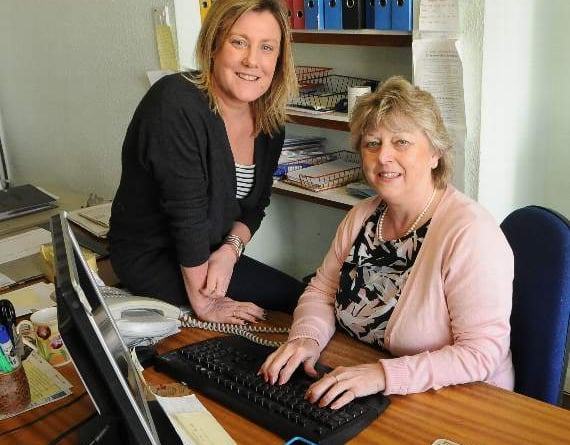OFTEN when domestic violence is in the news it is the parent, usually the woman, whose harrowing story is being told, but as most of it takes place in the family home the children are silent witnesses to the violence.
They are caught up in the crossfire of warring adults and sometimes they too are attacked or sexually abused and have no-one to help them deal with the fear they are experiencing, sometimes daily.
Also, because they feel shame, although it is no fault of their own, they often don’t or wont tell what is happening to a teacher or even their closest friends.
They harbour anger as well as fear and often this will spill out into disruptive behaviour toward other family members, in class, or on the streets, putting them at risk of breaking the law.
Now these young victims of domestic violence have someone to turn to, to help them and to give them hope.
The organisation is called The Bridges Support Project and behind it are two remarkable women who run it from their office in Alton across a network covering Bordon, Whitehill, Liss, Petersfield, and a wide area of East Hampshire.
They are Caroline Potter, who through art and craft therapy has found her unique way of reaching the young people she sees who have been traumatised by witnessing violence, and Wendy Rye, who handles the funding and running of the project.
Most of it is done on a shoestring, especially this year as they have lost their East Hampshire District Council grant and it takes £26,000 per year to run the project.
However, as Wendy said: “We have been lucky in getting a £10,000 grant from the Lottery.”
So they are also grateful for donations or to people who will put on a fundraising event for them such as Bordon’s Phoenix Theatre, which held a curry and Elvis night for the cause.
The Bridges Support Project was launched, together with children’s services, and with a “very small pot of money”, in 2008 by a senior social worker, a family support worker from the locality team and Caroline Potter.
“At this time,” said Caroline, “I was working as the children’s worker in the East Hampshire Women’s Refuge, whom I joined in 2006. It soon became apparent that there was a serious need for support for children and young people who had witnessed or been victims of domestic abuse themselves.”
The Bridges Support Project works on the basis of referrals from schools, women’s refuges, and South Downs Domestic Abuse, offers primarily one-to-one support to children and young people aged between five and 18 while working within a safe and familiar environment, often a school.
The young person will be offered initially six 45-minute sessions depending on age and their ability to concentrate. Each child is assessed throughout the programme which can be flexible if needed.
The facilitator is aided with various art mediums in order to create a nurturing environment through art therapy in which the young person is not made to feel as though they have to communicate their experiences.
“Furthermore,” said Caroline, “the art mediums offer a healthy distraction if a young person is feeling anxious about their expectations of what the support may expect of them.
“It has been well researched and documented that outcomes for these children are seriously undermined in terms of educational achievement, emotional well being and social relationships.
“Our aim to give children the opportunity to explore their feelings, personal experiences and how the impact of the abuse has affected them.
“This approach allows them to find alternative methods of dealing with their anger, hurt and frustration. Most importantly, we hope to demonstrate to these children that it wasn’t their fault and that they are not alone.”
What Wendy and Caroline try to create is a “safe place” for a child where they can be taught to help deal with violent domestic life.
“Sadly,” said Caroline, “we hear of all kinds of violent abuse these children have suffered, including one recently involving witchcraft. Sometimes it is fuelled by alcohol or drugs or poverty.
In dealing with such children, Caroline stresses, the “first session is vital because if the child doesn’t respond, and some can be quite abusive and threatening, to encourage them I tell them the reason they are here is to talk to me”.
Caroline has combined a friendly and caring nature, plus a humorous approach to life, to help break down those first barriers when she first meets a child.
She does it in a gentle way through art, painting or craft, and as the child becomes absorbed in the project they begin to respond to her gentle questioning.
“You have to build up a relationship of trust and to teach the child what they are experiencing is not the normal way to live,” said Caroline.
The result has been an improvement in behaviour, educational achievement, emotional well-being and social relationships within the home and school environment.
Wendy said: “Giving the young person the opportunity to achieve their best potential in the future and, ultimately, hopefully breaking the cycle of abuse and steering them away from a life of crime, alcohol and drug abuse.”
Regular feedback is obtained from the young people, the parents or carers and the young people themselves are asked to rate how well they have been helped range from one to five, five being highest.
“The majority,” said Caroline, “rated between four and five with comments such as ‘I felt supported and helped, happy and secure’, ‘I enjoyed the project’, and ‘the project met my needs’.”
Also proving The Bridges Project is doing a good job are the number of children who attend the annual three-day ‘summer heat’ which has been supported by Radian Housing Association and includes workshops, art projects and activities for the children they have helped.
“We have a lot of fun and there is a lot of laughter” is a common tale from the kids.




